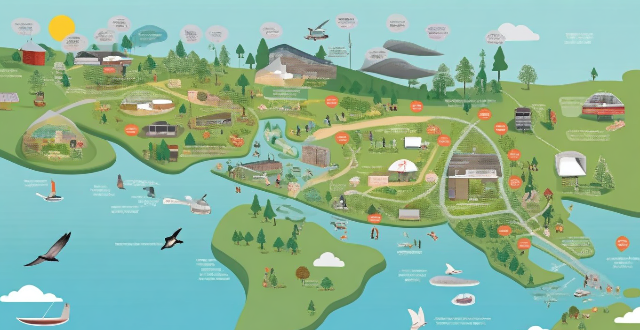Extreme weather events, such as hurricanes, floods, droughts, and heatwaves, have a significant impact on global climate change. They can exacerbate existing climate conditions and contribute to the overall warming of the planet by increasing greenhouse gas emissions, affecting ecosystems and biodiversity, disrupting agriculture and food production, and impacting human health and well-being. It is essential that we work together to mitigate the effects of extreme weather events and address the root causes of climate change to ensure a sustainable future for all.

Extreme Weather Events and Their Impact on Global Climate Change
Extreme weather events, such as hurricanes, floods, droughts, and heatwaves, have a significant impact on global climate change. These events can exacerbate existing climate conditions and contribute to the overall warming of the planet. In this article, we will explore how extreme weather events affect global climate change.
1. Increasing Greenhouse Gas Emissions
One of the most significant ways in which extreme weather events contribute to global climate change is by increasing greenhouse gas emissions. During natural disasters, such as hurricanes and wildfires, large amounts of carbon dioxide are released into the atmosphere. This increase in greenhouse gases traps more heat in the Earth's atmosphere, leading to further warming and more frequent extreme weather events.
Examples:
- Wildfires: Burning trees and vegetation release large amounts of carbon dioxide into the atmosphere.
- Hurricanes: When hurricanes hit cities and towns, they often destroy infrastructure, including power plants and transportation systems, leading to increased emissions from these sources.
2. Affecting Ecosystems and Biodiversity
Extreme weather events can also have a profound impact on ecosystems and biodiversity, which in turn affects global climate change. Natural disasters can destroy habitats, disrupt food chains, and lead to the extinction of species. This loss of biodiversity can make it harder for ecosystems to adapt to changing climate conditions, ultimately contributing to further warming.
Examples:
- Floods: Floods can wash away soil nutrients, making it difficult for plants to grow and thrive in affected areas.
- Heatwaves: High temperatures can cause coral bleaching in oceans, leading to the death of coral reefs and the organisms that depend on them for survival.
3. Disrupting Agriculture and Food Production
Extreme weather events can also disrupt agriculture and food production, which has implications for both local communities and global climate change. Droughts, floods, and heatwaves can damage crops and reduce yields, leading to food shortages and higher prices. This can exacerbate poverty and hunger in affected regions while also contributing to deforestation as people clear land for farming.
Examples:
- Droughts: Droughts can cause crop failures, leading to reduced food supplies and increased prices.
- Floods: Floodwaters can contaminate fields with sediment and debris, making it difficult or impossible to grow crops in affected areas.
4. Impacting Human Health and Well-being
Finally, extreme weather events can have severe consequences for human health and well-being, which indirectly affects global climate change. Natural disasters can cause injuries, illnesses, and even death among vulnerable populations. They can also lead to displacement and migration as people seek safer environments or better access to resources like clean water and food.
Examples:
- Heatwaves: High temperatures can cause heat stroke, dehydration, and other heat-related illnesses.
- Floods: Floodwaters can carry disease-carrying insects and animals into populated areas, leading to outbreaks of waterborne illnesses like cholera.
In conclusion, extreme weather events play a crucial role in shaping our planet's climate. By contributing to greenhouse gas emissions, affecting ecosystems and biodiversity, disrupting agriculture and food production, and impacting human health and well-being, these events exacerbate existing climate conditions and contribute to the overall warming of the planet. It is essential that we work together to mitigate the effects of extreme weather events and address the root causes of climate change to ensure a sustainable future for all.